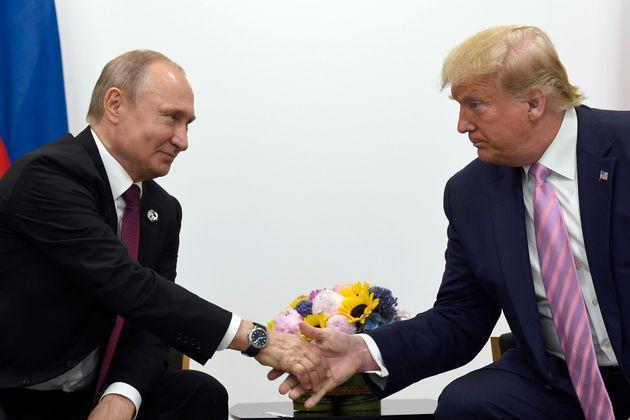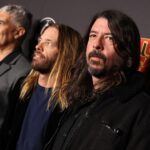WASHINGTON ― Russian dictator Vladimir Putin may be accused of slaughtering children and overseeing other war crimes in Ukraine, but that’s not stopping longtime admirer and former U.S. President Donald Trump from asking him for political help again.
Trump, who tried to overthrow American democracy in an attempt to retain power despite losing the 2020 election, is now asking Putin to find damaging information on his successor’s son.
“I would think Putin would know the answer to that,” Trump said in an interview airing on Real America’s Voice, a pro-Trump website, regarding a payment a decade ago from a Russian oligarch’s wife to a company founded by Hunter Biden, son of President Joe Biden. “I think he should release it.”
Trump’s staff did not respond to HuffPost’s queries about the matter.
It’s been nearly six years since Trump called on Russia to “find” emails from then-Democratic nominee Hillary Clinton, Trump’s rival in the 2016 presidential election. “Russia, if you’re listening, I hope you’re able to find the 30,000 emails that are missing,” he said at a July 27, 2016, news conference.
Subsequent investigations determined that Russia did, in fact, honor Trump’s request, starting that same day. Putin’s intelligence services carried out a multifaceted effort to boost Trump’s campaign, including the theft of thousands of documents from the Democratic National Committee and Clinton’s campaign advisers.
Putin then began releasing the stolen material in the final month of the campaign through the allied WikiLeaks group, and Trump ― even though he had been told by U.S. intelligence agencies that Russia had carried out the theft ― centered the last few weeks of his campaign on that material.
“We love WikiLeaks!” he would proclaim from the stage.
Trump, angry afterward that U.S. prosecutors were investigating his campaign’s links to Russia, seized on a new conspiracy theory being spread by Russian spies: that Ukraine had actually helped Clinton in 2016, and that a server containing her emails had been cached somewhere in that country.


His obsession with that theory and Hunter Biden, who had used his father’s name and position as vice president to win consulting business in Ukraine in 2014 and 2015, ultimately led to Trump’s first impeachment, after he tried to extort that country’s new president into announcing an investigation into Joe Biden, whom Trump feared most as a 2020 challenger.
Trump’s affinity for Putin, though, long predates even his 2016 presidential campaign.
He repeatedly praised Putin for at least a decade as he tried to build a condominium tower in Moscow. In a 2007 letter, Trump told Putin he was “a big fan.” He continued to push his “Trump Tower Moscow” project even as he ran for president in 2015 and 2016, and publicly lauded Putin as a better leader than then-President Barack Obama.
Once in the White House, Trump continually attacked NATO and the European Union ― actions that aligned with Putin’s long-term objectives of weakening or destroying both institutions. He falsely claimed that the military alliance created by the United States after World War II and the free-trade zone were somehow cheating American taxpayers. He mused about withdrawing from NATO entirely, and reportedly had intended to do so if he’d won a second term.
Trump also kept praising and defending Putin, even telling the world in 2018 that he believed Putin over his own intelligence agencies regarding the dictator’s work to get Trump elected. A year later, he tried to have Russia readmitted to the G7 group of large democratic economies, from which it was expelled for invading and annexing Crimea in 2014. Trump said he understood Russia’s need to keep the Crimean Peninsula because it had built a base there for its “large and powerful submarines.”
Even on the day Putin sent his armies into Ukraine last month, Trump called him a “genius” and “very savvy” for having invaded. Since then, as images and stories of Putin’s slaughter have emerged, Trump has criticized the invasion, but still has not been critical of Putin personally.
After losing the 2020 election by 7 million votes nationally and 306-232 in the Electoral College, Trump became the first U.S. president in more than two centuries of elections to refuse to hand over power peacefully. His incitement of the 2021 assault on the U.S. Capitol, a last-ditch attempt to remain in office, killed five people, including one police officer. That day’s violence also injured another 140 officers and led to four police suicides.
Nevertheless, Trump remains the dominant figure in the Republican Party and is speaking about running for the presidency again in 2024.
This article originally appeared on HuffPost and has been updated.




